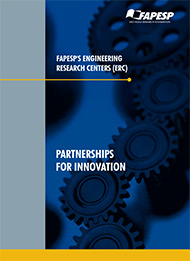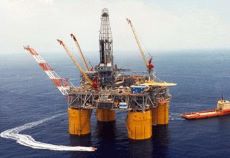Companies in the oil and gas industry invest in research and development

22 de novembro de 2018
By Marcos de Oliveira | Agência FAPESP – Professionals employed by the research and development (R&D) departments of the companies that drill for oil and gas in the Brazilian subsalt plays of Santos and Campos exchanged experiences, described technological requirements and presented solutions at a workshop held on October 31, 2018, at FAPESP in São Paulo City.
Proposed by Brazil’s National Petroleum Agency (ANP), the workshop was attended by representatives of Petrobras, Equinor (ex-Statoil), Petrogal, Repsol, Shell and Total. Alongside Petrobras, which is a Brazilian state-owned enterprise and has been engaged in research locally since 1966, the foreign companies are also required to invest 1% of their gross revenue from production into R&D concerning high-production or high-profitability oilfields, according to ANP. In 2016, they became oil well operators in Brazil, alone or in partnership with Petrobras. They conduct research in their countries of origin, but in addition to this contractual requirement, they need to adapt to local conditions.
A large proportion of this mandatory 1% must be invested in projects conducted in partnership with Brazilian universities and research institutions to identify problems and develop technological solutions to facilitate oil and gas prospecting, production and transportation. Another objective is the achievement of cost savings in these activities, which take place in inhospitable locations such as offshore platforms over 250 km from the coast and involve drilling at depths more than 2 km below the surface, down to as far as 3 km under the seabed, to reach the subsalt layer of oil and gas.
“The workshop was designed to give companies with mandatory investment in R&D because of the concession an opportunity to talk about their needs, ideas and strategies,” said FAPESP CEO Carlos Américo Pacheco.
The companies presented highly similar technological problems and requirements, such as the difficulty of dealing with high-pressure and low-temperature conditions, which require the development of new materials, for example. Other points in common were plans to digitize all production control processes and monitor production remotely in order to minimize the need for a human presence on these offshore platforms.
Most of the companies expressed support for the effort to build ties with research groups at universities and with startups. Petrobras, for example, has had relationships with universities and science and technology institutions in Brazil for many years. The foreign companies engage in similar collaborations abroad and are starting to partner with outside research bodies in Brazil as well.
In this context, FAPESP told the companies’ representatives about two types of initiative established by it or with its participation: Engineering Research Centers (ERCs) and four startups that are funded by the FAPESP Innovative Research in Small Business Program (PIPE) and are pursuing projects and solutions related to the oil and gas industry.
The ERCs were presented by FAPESP Scientific Director Carlos Henrique de Brito Cruz, who cited the example of Shell, which, with FAPESP, is co-funding an ERC called the Research Center for Gas Innovation (RCGI). This ERC is hosted by the University of São Paulo’s Engineering School (POLI-USP) and has a partnership with Imperial College London.
Another of FAPESP’s ERCs with an oil company as a partner, Equinor in this case, is the Engineering Research Center in Reservoir and Production Management. Hosted by the University of Campinas (UNICAMP), this ERC is finalizing preparations to begin executing projects.
Innovative startups
The companies’ presentations at the workshop held at FAPESP showed that they are all open to partnerships for the joint development of technology as well as innovative equipment, software and other inputs to improve their performance in subsalt activities.
Integration with startups was also recommended as an opportunity for R&D to develop technology with universities and bring new solutions to market for implementation by the companies.
ANP and FAPESP invited nine startups to deliver short talks on how they could contribute solutions for the oil and gas industry. Four have won funding from PIPE for their projects: Altave and Clorovale in São José dos Campos, Solpe in Campinas, and Seip 7 in Sorocaba.
Altave develops high-tech tethered balloons equipped with cameras for monitoring as well as telecommunications gear for broadband internet access and mobile telephony when positioned 50-200 m above the ground.
Clorovale produces high-strength synthetic diamond coatings to make metal parts and equipment more durable and resistant to corrosion or attrition. This startup has developed a CVD diamond bit for use in drilling oil wells.
Solpe develops computational solutions to provide decision-making support for oil reservoir management, including simulations, geophysical analytics and risk assessment.
Seip 7, which is also funded by PIPE, develops environmental monitoring systems and sensors for detecting oil and gas leaks.
Other startups that took part in the workshop included Pix Force from Porto Alegre (Rio Grande do Sul state), which offers remote sensing solutions based on drones and integration with satellite sensor data, and PHDSoft, founded in Rio de Janeiro and now based in Houston, Texas (USA), which produces software for predicting structural failures and assisting in the maintenance of oil rigs.
The oil industry R&D professionals were also given a pitch by Teia Labs, another firm based in Porto Alegre, offering computational platforms and artificial intelligence for real-time data analysis to identify failures in deep-water oil and gas production systems.
The last two startups that presented to the workshop are based in São Paulo State. CBP Perfuratrizes do Brasil in São Carlos produces hydraulic drilling rigs. Argonáutica in São Paulo City produces computer systems for in-port ship analysis and cable assessment as well as customized software for the oil and gas industry.



